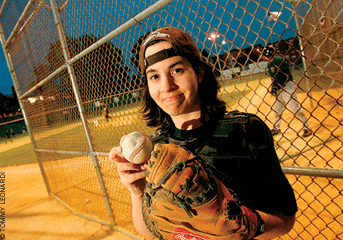
Class of ’99 | On a perfect Sunday in April, 19 women, ranging in age from 16 to 44, gather at the Belmont Plateau in Philadelphia’s Fairmont Park to loosen their limbs in the pre-season sun. The chatter is about wedding plans, creaky knees, and the joys of Daylight Savings Time as the reassuring thwap of ball meeting glove punctuates their remarks.
In between greeting players, handing out forms, and pounding in stakes for bases, Narda Quigley C’99, founder of the Philadelphia Women’s Baseball League (PWBL), surveys the scene and permits herself a smile. At this, the first practice of the league’s second year, the numbers are up, the talent pool is promising, and, as every baseball fan knows, anything is possible.
The PWBL is actually one of about 45 all-women leagues that exist around the country, according to Jim Glennie, president of the Michigan-based American Women’s Baseball League. In its inaugural season, the independent PWBL was comprised of 38 players, ranging in age from 14 to 52, divided into three equal teams. “Our goal is to establish a safe, fun, learning-oriented, and competitive environment through league play during the spring, summer, and fall seasons for women of all ages and skill levels,” says Quigley. “The only people we answer to are our players.” This year, they are hoping to recruit at least 50 players.
Although the PWBL did form a tournament team last August that placed second in two national tournaments, the goal of the league is primarily recreational. Games are played on weekends throughout the summer, with a league championship game scheduled for July 31. The teams play each other and against a 58-and-over men’s team. “We couldn’t beat them last year,” admits Quigley. “They’ve all been playing so long they know the game incredibly well.”
Which is also true of most of the women players, except that the game they know is softball. “Almost all our players have played softball at some point in their lives,” explains Quigley.
Elaine Spangler GGS’02, project manager in genetics and epidemiology at HUP, plays softball in the Fairmount Park Women’s League but also joined the PWBL precisely because it was something she wasn’t able to do growing up. Karen McGovern C’83, who threw the javelin for Penn during her undergraduate days and played high-school softball, had a similar experience. Sarah Wahlberg, a third-year Ph.D. candidate in classics at Penn, had never played baseball (and only a bit of softball) until Quigley convinced her to give it a try. “It’s been a learning experience for me,” she says wryly. “It’s an amazing group of women who are all very supportive and fun to spend time with.”
The diminutive, 27-year-old Quigley, whose day job is assistant professor of management at Villanova University, is a true devotee of the sport. “There was a time I thought I would be the first female professional baseball player,” she admits, noting that she played baseball with the boys all the way through junior high. In 7th and 8th grade she also played softball, although she found it “too girly.”
By the time she got to high school, however, the level of play had improved enough for her to make the switch to softball. “It took me a while to adjust,” she says. “The short game is entirely different.” Quigley played for four years at Sidwell Friends School and came to Penn because the coach at the time, Linda Carothers, was “amenable to walk-ons,” Quigley recalls.
Though her teams at Penn (coached by Carothers and then Carol Kashow) were “perennially sub-.500,” their losing record did little to diminish Quigley’s love of the experience.
After graduating with a double major in economics and international relations, she joined the Eastern Women’s Baseball Conference—the DC/Baltimore league—while completing her Ph.D. in management with a concentration in organizational behavior at the University of Maryland. The DC/Baltimore league, started by Joan Milliken Gr’80, “definitely filled a void in my life,” says Quigley.
In July 2003, she returned to Penn as the post-doc research fellow for the GLOBE project (a multi-nation, multi-phase research project examining cross-cultural differences in leadership), and then began teaching at Villanova last fall. Her positive experience on the Washington team inspired her to start the PWBL.
From all accounts, Quigley has done a remarkable job of getting the PWBL off the ground. “Narda has done a great job in Philadelphia,” remarks Glennie. “That league developed as quickly as any I’ve seen.”
She threw herself into the project, enlisting the aid of friends, especially those in high places. One is Meghan Leary C’99 GEd’03, manager of fan development and educational programs for the Philadelphia Phillies and a former teammate of Quigley’s at Penn.
“When Narda called me last spring, she was very thorough and determined to make the PWBL work, and her plans fit well with the Phillies in terms of developing the game of baseball in the area,” Leary recounts. “I was thrilled that the Phillies were able to provide equipment and uniform shirts for the league and we will continue to do this.”
Leary drafted Quigley as a member of the executive committee for the Softball Carpenter Cup, a new high-school softball tournament for the best players in the region. “Narda has been a wonderful asset in this process,” Leary says.
On the field, Quigley is all about positive reinforcement and constant encouragement, qualities she also practices in the classroom. “My classroom management techniques have helped me manage various situations with players,” she elaborates. “The basic skills (organization, planning, leading) are the same and the importance of empathy and emotional intelligence is very apparent in both spheres.”
As for other connections between her professional and personal lives, Quigley’s involvement with the PWBL is right out of her textbooks. “I’ve been involved with sports teams all my life, and part of what drove me into graduate school was that I wanted to know more about what makes an effective team and how leaders can work to improve team interactions,” she says. “I wound up studying this very question for my dissertation.”
Back on Belmont plateau, Quigley organizes her teammates for batting practice. She works patiently with those making the switch from softball to baseball, and when the team needed a take-charge catcher, she took on that job, too.
“It’s incredible what Narda has done,” says McGovern. “She got the fields donated, the uniforms donated, the equipment donated, the coaches to volunteer their time … To be successful after only one year is truly amazing.”
—Kathryn Levy Feldman




